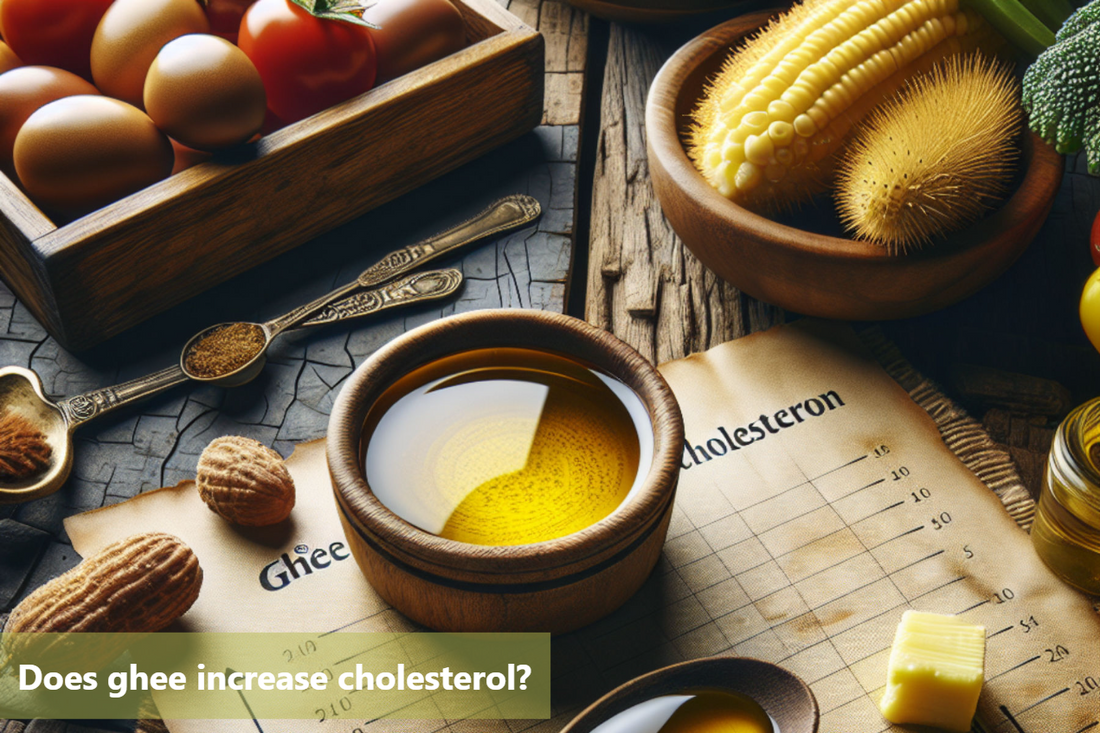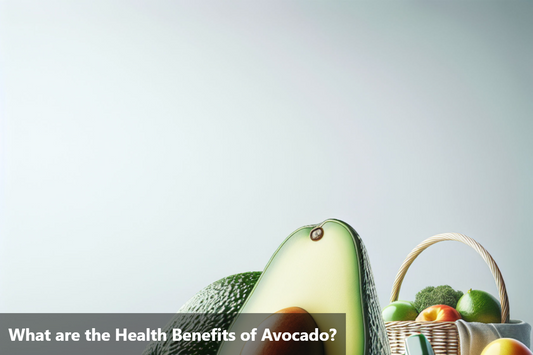Ghee, a staple in South Asian cuisine, is rich in fat-soluble vitamins and unique flavors. Despite containing cholesterol, ghee is mainly composed of healthy saturated fats that can improve cholesterol levels. Moderate consumption may even boost HDL levels. Ghee's impact on cholesterol varies based on individual diet choices. Remember, moderation is essential for enjoying ghee's flavors and potential health benefits.
What is Ghee
Unsalted butter is heated slowly until it melts and separates into three layers: a frothy top layer, a clear middle layer (ghee), and a solid bottom layer (milk solids).
The froth is skimmed off, and the clear middle layer (ghee) is carefully poured off, leaving the milk solids at the bottom. This process ensures that the ghee is free from lactose and casein, making it suitable for those with dairy sensitivities.
Nutritional Content of Ghee
Amount in 1 tablespoon of ghee |
15g |
Calories |
130 Kcal |
Fat |
14 grams |
Saturated fat |
9 grams |
Monounsaturated fat |
4 grams |
Polyunsaturated fat |
0.5 grams |
Protein |
trace amounts |
Carbs |
trace amounts |
Vitamin A |
13% of the Daily Value (DV) |
Vitamin E |
3% of the DV |
Vitamin K |
1% of the DV |
Cholesterol Content in Ghee
Ghee, a clarified butter popular in Indian cuisine, is known for its robust flavor and nutritional value. One tablespoon of ghee typically contains 7.5-8.0 grams of saturated fats and approximately 32-33 mg of cholesterol.
Moderation: Due to its high cholesterol and saturated fat content, it is advisable to consume ghee in moderation, especially for individuals with cardiovascular concerns or high cholesterol levels. Health experts recommend limiting daily ghee intake to less than 1-2 teaspoons for individuals with elevated cholesterol levels. It is essential to be mindful of dietary cholesterol intake, as ghee contributes to your daily cholesterol consumption.
Health Benefits: Despite its high cholesterol content, ghee also has some health benefits, such as containing fat-soluble vitamins (A, D, E, and K) and butyrate, which supports gut health.
Although some cholesterol is necessary for bodily functions, excessive LDL cholesterol levels can pose health risks such as heart disease. By incorporating ghee in moderation as part of a balanced diet, you can enjoy its benefits while maintaining a healthy lifestyle. For tailored guidance on managing your cholesterol, consult a healthcare professional or nutritionist.
Is Ghee Good or Bad for Cholesterol?
While ghee is a source of saturated fats, which have been traditionally linked to high cholesterol, recent studies suggest that the type of saturated fats in ghee may not have the same negative effects on cholesterol as previously believed.
Ghee contains medium-chain triglycerides (MCTs), which are fats that are metabolized differently in the body compared to long-chain triglycerides found in other saturated fats. Some research indicates that MCTs in ghee may actually help increase the levels of "good" HDL cholesterol.
However, it is important to consume ghee in moderation as part of a balanced diet. Excessive intake of any type of fat, including ghee, can contribute to weight gain and other health issues.
In conclusion, while ghee may not be as harmful to cholesterol levels as once thought, it should still be consumed in moderation as part of a well-rounded diet to maintain overall heart health.
Comparison of Types of Ghee
Aspect |
Cow Ghee |
Buffalo Ghee |
Other Types of Ghee (e.g., Sheep, Goat) |
|---|---|---|---|
Source |
Milk of cows |
Milk of buffaloes |
Milk of sheep, goats, or mixed sources |
Color |
Yellow (due to beta-carotene) |
White or pale yellow |
Varies (typically white or pale yellow) |
Flavor |
Mild, nutty |
Richer, stronger |
Varies (often mild to strong, depending on the source) |
Fat Content |
~14g per tablespoon |
~14g per tablespoon |
~14g per tablespoon (varies slightly by source) |
Saturated Fat |
~9g per tablespoon |
~9g per tablespoon |
~9g per tablespoon (varies slightly by source) |
Calories |
~112 per tablespoon |
~120 per tablespoon |
~112 per tablespoon (varies slightly by source) |
Cholesterol |
~33 mg per tablespoon |
~31 mg per tablespoon |
~33 mg per tablespoon (varies slightly by source) |
Vitamins |
Rich in vitamins A, D, E, K |
Rich in vitamins A, D, E, K |
Rich in vitamins A, D, E, K |
Health Benefits |
Supports digestion, immune system |
Supports digestion, immune system |
Supports digestion, immune system |
Texture |
Smooth |
Creamier |
Varies (often smooth but can differ by source) |
Butyrate Content |
High |
High |
High |
Lactose/Casein Content |
Minimal (due to clarification) |
Minimal (due to clarification) |
Minimal (due to clarification) |
Shelf Life |
Long (can be stored at room temperature) |
Long (can be stored at room temperature) |
Long (can be stored at room temperature) |
Recommendations and Conclusion
When we look at how ghee affects cholesterol, we need to know if ghee makes cholesterol levels go up. Studies show that the cholesterol in ghee can impact your overall cholesterol levels. But it's important to use ghee in moderation when adding it to your diet.
Remember, not all cholesterol is bad. Ghee has both good (HDL) and bad (LDL) cholesterol. It's better to choose grass-fed ghee because it has more beneficial nutrients. If you have heart issues or high cholesterol, it's a good idea to limit how much ghee you eat to avoid negative effects.
In summary, eating ghee can be part of a healthy diet if you do it mindfully. To figure out how much ghee is right for you, it's best to talk to a healthcare provider or nutritionist based on your health needs. While ghee can offer many benefits as a source of healthy fats, remember to balance it with other foods for your overall well-being.
FAQs:
-
Does ghee increase cholesterol levels?
Consuming ghee in moderation may not increase cholesterol levels significantly. However, it is high in saturated fats, so overconsumption can potentially raise cholesterol levels.
-
Is ghee better for cholesterol compared to butter?
Ghee is often considered a better option than butter for cholesterol as it contains lower levels of harmful trans fats. However, it is still important to consume ghee in moderation.
-
Can ghee be a part of a heart-healthy diet?
Ghee can be included in a heart-healthy diet when consumed in limited quantities. It is advisable to choose low-fat cooking oils and pair ghee with a balanced diet rich in vegetables, fruits, and whole grains.
-
How does ghee affect "bad" cholesterol (LDL)?
Ghee contains high levels of saturated fats, which can contribute to an increase in "bad" LDL cholesterol levels if consumed excessively. It is crucial to monitor your intake of ghee to maintain healthy cholesterol levels.
-
Should individuals with high cholesterol levels avoid ghee?
Individuals with high cholesterol levels should consume ghee in moderation and consult with a healthcare provider or dietitian to ensure it fits into their overall dietary plan. It is essential to balance ghee intake with other heart-healthy food choices.
This Blog post is an initiative by DiabeSmart, to provide accurate and Nutritionist / Doctor approved information related to Diabetes. DiabeSmart is India's first Food brand designed specifically for Diabetics, that has been clinically tested on Diabetics and Pre-Diabetics to deliver 55% - 70% lower Sugar spikes. DiabeSmart is part of Lo! Foods - India's leading brand for Everyday Functional Health foods.






